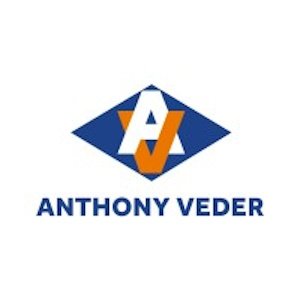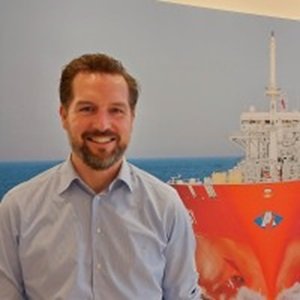Anthony Veder - Experts & Thought Leaders
Latest Anthony Veder news & announcements
Inmarsat Maritime, a Viasat company, has agreed a deal with Anthony Veder to upgrade the pioneering gas shipping company’s entire fleet to Inmarsat NexusWave. Purpose-built for the specialised transport of gases, including petrochemical gases and liquefied natural gas (LNG) and easily identifiable by their ‘Coral’ prefix, Anthony Veder ships operate in both coastal and deep-sea environments, making multi-dimensional high-speed connectivity essential for seamless communications. Development of NexusWave Anthony Veder also played a crucial role in shaping the development of NexusWave through its participation As a longstanding Inmarsat Maritime customer and early adopter of Fleet Xpress, launched in 2016, Anthony Veder also played a crucial role in shaping the development of NexusWave through its participation in preliminary discussions and beta testing. The solution is underpinned by a bonded network that brings together GEO, LEO and LTE services for consistent high-speed connectivity, even in traditionally congested areas, with unlimited data and global coverage. Requirements of modern shipping Jos Kooij, Digital Lead – Technology & Support, Anthony Veder, explained: “Our contribution to the development of NexusWave in early concept meetings and beta trials helped to shape a solution that meets the evolving requirements of modern shipping." "By combining the best of satellite and terrestrial technology, NexusWave delivers on its promise of connected confidence. We are particularly pleased with its capacity to support cloud-based business applications and advanced operational technology, which have exceeded our expectations.” Crew welfare and cybersecurity imperatives Veder’s decision to adopt NexusWave across its fleet was crew welfare and cybersecurity imperatives Also key to Anthony Veder’s decision to adopt NexusWave across its fleet were crew welfare and cybersecurity imperatives. By providing a fast, home-like onboard internet connection, NexusWave enables compliance with crew welfare regulations and helps companies to attract and retain the best seafaring talent. With secure-by-design infrastructure and traffic encryption as standard, the solution offers enterprise-grade cybersecurity, while segregated crew and business networks add another layer of protection. NexusWave maritime operations Benne Engelen, Chief Information Officer, Anthony Veder, commented: “We chose to roll NexusWave out fleetwide after experiencing a step-change in our simultaneous crew and operational communications during trials." "With unparalleled continuity of service and network segregation, both leisure and business applications run as smoothly and securely as they would at home or in the office, helping us to meet our objective of fully connected maritime operations while maintaining a happy and motivated workforce. It fosters our culture of collaboration, really bridging the physical distance as no other product can at this time.” Requirements and emerging regulations Ab Argam, Senior Sales & Key Account Manager, Inmarsat Maritime, said: “Anthony Veder’s fleetwide upgrade to NexusWave is just the beginning of its journey with the solution." "The company is following the Inmarsat technology roadmap, which we develop continuously in response to evolving requirements and emerging regulations. The next milestone will be passed with the service launch of the high-capacity ViaSat-3, which will further enhance connectivity and operational capabilities for NexusWave customers including Anthony Veder.”
Anthony Veder, a gas shipping company, has strengthened its partnership with NAPA, a global provider of maritime software and data services, to expand the use of electronic logbook solutions and ease regulatory reporting. The joint project between the two companies introduces the functionality of voyage reporting, helping Anthony Veder streamline onboard data collection and fulfill increasingly complex environmental regulatory requirements. Thus, the project contributes to shipping meeting its net zero target. NAPA Logbook With the new voyage reporting functionality, the NAPA Logbook reduces the administrative burden of regulatory compliance. It covers systems EU-MRV (Monitoring, Reporting, and Verification), and the IMO-DCS (Data Collection System). The digital platform enables the integration of logbooks with regulatory reporting; data is automatically shared with shoreside teams, via NAPA Fleet Intelligence, and with the verifier, in this case, DNV Emission Connect, in near real-time. DNV approval The platform goes beyond normal electronic logbook systems and can submit data for verification to DNV With type approval from DNV, the platform goes beyond normal electronic logbook systems and can submit data for verification to DNV, as well as other relevant stakeholders in the supply and emissions chain, in a format that meets all requirements. This provides end-to-end compliance support, removes duplication of work, and offers invaluable time savings for crew which would otherwise not be possible. Digitalisation With the initial success of NAPA Logbook across Anthony Veder’s fleet, the company is ramping up digitalisation to ease seafarer workload, boost morale, and reduce the margin for error. Since 2023, NAPA Logbook has already cut 2000 administrative hours per vessel – a 14% reduction. Digital tools can help reduce the administrative workload onboard and contribute to the accuracy of reporting, which is becoming increasingly important with regulations like the EU ETS and FuelEU Maritime. Regulatory reporting compliance Björn van de Weerdhof, Commercial and Sustainability Director at Anthony Veder, said, “Being compliant with regulatory reporting is important but is becoming more and more complex. Without digitisation and automation, this would be increasing time spent by our seafaring colleagues." "By partnering with NAPA, integrating their digital logbook, and through digital solutions and automated entries, we significantly reduced the administrative burden on board so our seafarers can focus on their core duties: operating our vessels in a safe, sustainable, and efficient way for our customers.” Streamlining data collection Tommi Vihavainen, Director, of Development, NAPA Safety Solutions, added, “We recognise that crew is already stretched thin, and new regulations only add to this challenge by diverting precious time from primary responsibilities." "Digitalisation of paper-based processes, using tools like NAPA Logbook, can streamline onboard data collection and reporting to minimise duplication of work, ensure regulatory compliance, meet sustainability goals, and, ultimately, contribute to creating a more satisfying work environment. We are proud of the positive impact we’ve been able to create for Anthony Veder in such a short amount of time and look forward to continuing our partnership.” Decarbonisation transition 54% of seafarers reported an increase in their workloads, 44% said they are feeling higher levels of stress The global maritime industry, and seafarers in particular, are grappling with new ways of working to support shipping’s decarbonisation transition. A recent survey by the International Seafarers Welfare and Assistance Network (ISWAN) revealed that 54% of seafarers reported an increase in their workloads, 44% said they are feeling higher levels of stress, and 33% fear potential criminalisation due to complex reporting requirements. Operational safety and efficiency Digital, integrated solutions like NAPA Logbook, through NAPA Fleet Intelligence, allow teams to tackle these issues by doubling down on automation, thereby minimising errors and saving time, and offering a holistic approach to operational safety and efficiency. By enabling data to be exchanged between systems, teams can enhance situational awareness and make better-informed decisions on critical operational matters and regulatory compliance, with greater speed and accuracy, as the platform also gives a centralised data overview.
Anthony Veder proudly announces the launch of two VentoFoils sails onboard of ethylene carrier, Coral Patula, delivered by Econowind. With this installation, Anthony Veder is the first worldwide to install sails onboard a gas carrier. Later this year sister ship Coral Pearl will be equipped with two similar sails. By retrofitting existing gas carriers, the company unlocks the potential of wind propulsion as a sustainable solution for the maritime industry. Net-zero emitter by 2035 Björn van de Weerdhof, Commercial and Sustainability Director at Anthony Veder, shares: "In our sustainable roadmap, we have set the ambitious target of becoming a net-zero emitter by 2035. Achieving this goal requires action today. While we focus on optimising the design of newbuilds and running those on (bio-) LNG, we are equally committed to enhancing the efficiency of our existing fleet." Björn van de Weerdhof adds, "This allows us to reduce our carbon footprint immediately. Wind-assisted propulsion is a key step in this effort, and our collaboration with Econowind reflects the strength of our partnerships. Additionally, we are exploring other solutions such as propulsion train optimisation and joint action we can take with or customers such as lower speeds through Just in Time arrival and making use of shorepower." Substantial fuel savings Rens Groot, Chief Operations Officer at Econowind is proud of this fast-track project, stating: "Anthony Veder conducted a thorough analysis before selecting the VentoFoils, including an advanced business case calculation balancing benefits and realistic costs. This allowed us to see key advantages, such as speed increases for gas carriers, where VentoFoils help offset engine power limitations." Rens Groot adds, "Meeting the tight timeline was possible due to Anthony Veder’s experienced team in project execution and dry dockings. They showed leadership by being the first to implement wind-assisted propulsion on a gas carrier. This vessel is set to achieve substantial fuel savings and CO2 reductions with an attractive payback period." IMO wind conditions By retrofitting 2 Ethylene carriers in its fleet with Econowind VentoFoils, Anthony Veder will be using wind energy to significantly reduce the fuel consumption of vessels. The system is designed to work alongside existing engines, providing a boost in propulsion through the power of wind. Based on IMO wind conditions, we anticipate fuel savings of around 5%, with the potential of more than 10% in optimal wind conditions. By using less fuel, the company not only cuts down on the energy bill, but more importantly on greenhouse gas emissions.






